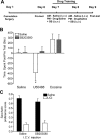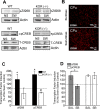Stress-induced p38 mitogen-activated protein kinase activation mediates kappa-opioid-dependent dysphoria
- PMID: 17959804
- PMCID: PMC2481272
- DOI: 10.1523/JNEUROSCI.3769-07.2007
Stress-induced p38 mitogen-activated protein kinase activation mediates kappa-opioid-dependent dysphoria
Abstract
The molecular mechanisms mediating stress-induced dysphoria in humans and conditioned place aversion in rodents are unknown. Here, we show that repeated swim stress caused activation of both kappa-opioid receptor (KOR) and p38 mitogen-activated protein kinase (MAPK) coexpressed in GABAergic neurons in the nucleus accumbens, cortex, and hippocampus. Sites of activation were visualized using phosphoselective antibodies against activated kappa receptors (KOR-P) and against phospho-p38 MAPK. Surprisingly, the increase in P-p38-IR caused by swim-stress exposure was completely KOR dependent; P-p38-IR did not increase in KOR(-/-) knock-out mice subjected to the same swim-paradigm or in wild-type mice pretreated with the KOR antagonist norbinaltorphimine. To understand the relationship between p38 activation and the behavioral effects after KOR activation, we administered the p38 inhibitor SB203580 [4-(4-fluorophenyl)-2-(4-methylsulfonylphenyl)-5-(4-pyridyl)-1H-imidazole (i.c.v.)] and found that it selectively blocked the conditioned place aversion caused by the kappa agonist trans-3,4-dichloro-N-methyl-N-[2-(1-pyrrolidinyl)cyclohexyl]-benzeneacetamide (U50488) and the KOR-dependent swim stress-induced immobility while not affecting kappa-opioid analgesia or nonselectively affecting associative learning. We found that the mechanism linking KOR and p38 activation in vivo was consistent with our previous in vitro data suggesting that beta-arrestin recruitment is required; mice lacking G-protein-coupled receptor kinase 3 also failed to increase p-p38-IR after KOR activation in vivo, failed to show swim stress-induced immobility, or develop conditioned place aversion to U50488. Our results indicate that activation of p38 MAPK signaling by the endogenous dynorphin-kappa-opioid system likely constitutes a key component of the molecular mechanisms mediating the aversive properties of stress.
Figures






Comment in
-
p38: the link between the kappa-opioid receptor and dysphoria.J Neurosci. 2008 Mar 5;28(10):2299-300. doi: 10.1523/JNEUROSCI.5679-07.2008. J Neurosci. 2008. PMID: 18322076 Free PMC article. Review. No abstract available.
References
-
- Akil H, Watson SJ, Young E, Lewis ME, Khachaturian H, Walker JM. Endogenous opioids: biology and function. Annu Rev Neurosci. 1984;7:223–255. - PubMed
-
- Beardsley PM, Howard JL, Shelton KL, Carroll FI. Differential effects of the novel kappa opioid receptor antagonist, JDTic, on reinstatement of cocaine-seeking induced by footshock vs cocaine primes and its antidepressant-like effects in rats. Psychopharmacology (Berl) 2005;183:118–126. - PubMed
Publication types
MeSH terms
Substances
Grants and funding
LinkOut - more resources
Full Text Sources
Other Literature Sources
Medical
Molecular Biology Databases
